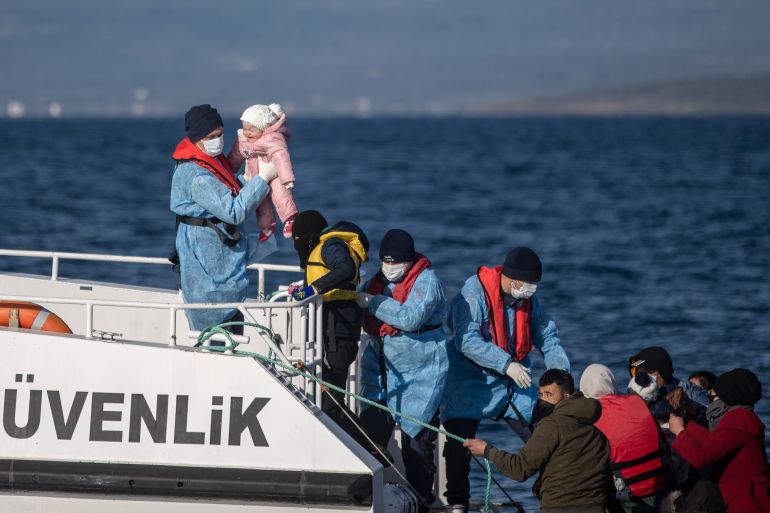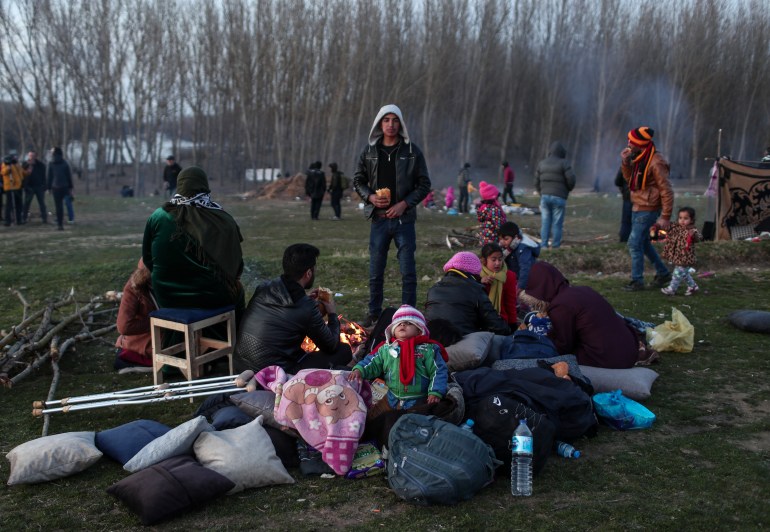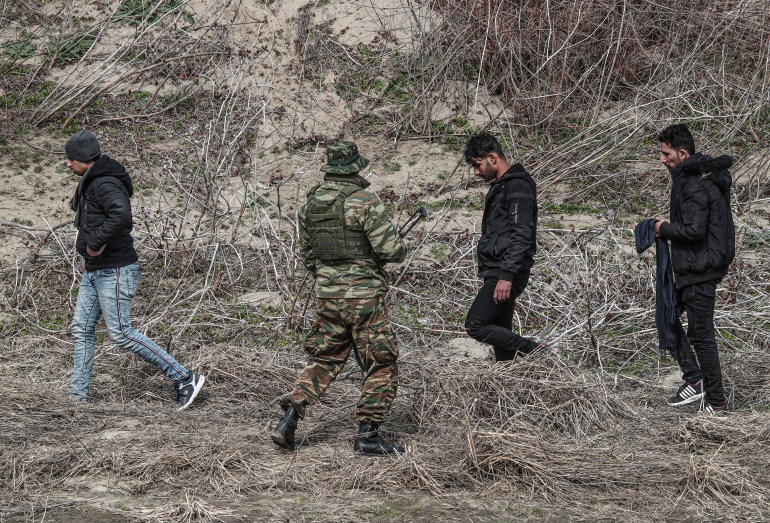Refugee pushbacks: Greece prepares to indict whistleblowers
Activists raise alarm over the pattern of pushbacks, which gained momentum after Turkey encouraged refugees to enter Greece, as the EU turns a blind eye.

Athens, Greece – In the small hours of April 3, a rubber dinghy filled with asylum seekers set out from the Turkish coast near the town of Babanli.
Among the 27 passengers, 11 were children. Their destination was the Greek island of Lesbos.
Keep reading
list of 4 itemsRefugees bound for Greece drown off Turkish coast
Fire tears through Greece refugee camp after coronavirus protest
Turkey-Greece refugee crisis: Germany willing to take children in
By 4:31am, when they were just 450 metres (1,476 feet) from Lesbos’s northern shore, their engine sputtered out.
At 5:20am, a Greek coastguard vessel spotted them, took the passengers on board, sped them back into Turkish territorial waters, transferred them onto a life raft and notified the Turkish coastguard to pick them up.
That story, with precise geolocation coordinates and timings, was told by Aegean Boat Report (ABR), a non-governmental organisation run from Tromso by a Norwegian named Tommy Olsen.
Olsen says his sources are the asylum seekers themselves, who call ABR when in distress, send GPS map points of where they are, and provide videos of what authorities do.
Olsen set up ABR to provide precise information to coastguards and independent search-and-rescue operators of the whereabouts of distressed refugee boats. ABR was registered as a Norwegian NGO in October 2018.
The idea was that the authorities would rescue asylum seekers and bring them onshore to be registered and interviewed, in accordance with the 1951 Geneva Convention on the Status of Refugees.
Turning them around without assessing their need for international protection is a contravention of that law, which Greece has ratified.
Greek authorities deny the account of the April 3 pushback, as they deny all such allegations.
For his pains, Olsen expects Greek authorities will soon indict him as a refugee smuggler and spy. That, at least, is what was leaked to Greek media last September, when ABR was named along with three other organisations as the target of a police investigation.

“I have been called an enemy of the state in Greek parliament, on national television,” Olsen told Al Jazeera.
“They tried to make it that I have been in cooperation with Turkish authorities, I work with smugglers, I am a trafficker, I am rich, I have money, I have houses paid by the Turkish authorities in Turkey, and of course I am a spy because I know where the Greek boats are – for some reason they think I know where the Greek coastguard is, to alert smugglers.”
If anything, the refugees consider that Olsen has betrayed them by sharing their location with Greek authorities who deport them.
“I call the [Greek] coastguard and hope they will take them back to Greece … I’m actually trying to obey the laws by informing the right authorities, but the problem is they are breaking the law whenever they feel like it.”
Crackdown on non-state actors
Late last September, two dozen riot police boarded the search-and-rescue boat Mare Liberum in Mytilene harbour and seized mobile phones and laptops.
Two days later, the crew heard they were to be indicted in the Greek smuggling investigation.
“This was all just leaked to the press. Our lawyer went to the prosecutor asking, trying to get information, but nothing was provided,” Philipp Hann, the boat’s captain, tells Al Jazeera.
Haris Petsikos, Hann’s lawyer, says he is sure a criminal prosecution is in the pipeline, even though “there has been no official charge”.
But he is incensed over the media leak.
“It is not only unorthodox … Names have come out in the media, which were leaked by the police and the journalists they were leaked to have told us. It violates the presumption of innocence and their personal data [protection], and that is unacceptable.”
Petsikos also represents the search-and-rescue group Emergency Response Centre International; 30 of its members were indicted on similar charges in September 2018, following media leaks.
That case is still pending.

Hann, who has operated Mare Liberum in the east Aegean since 2018, says the standard procedure was to sail where crossings usually happen.
“We simply observe and document the movement of the actors and inform the authorities when we see a refugee boat,” he says.
Until last year, the Greek and Turkish coastguards were rescuing and pulling back boats in their respective jurisdictions, he says.
The big change in official attitudes came in March last year.
That is when Turkish President Recep Tayyip Erdogan encouraged asylum seekers to cross Greek borders and enter the European Union at will, even though Turkey has a standing agreement with the EU to hold undocumented migrants back.
Greek border guards at the Evros River repulsed tens of thousands of attempted crossings.
The Greek coastguard switched from search and rescue to deterring and repulsing refugee boats, which it said were sometimes accompanied by Turkish coastguard vessels.
Both on land and at sea, Greek authorities were reinforced by Frontex, the European border and coastguard.
“Since March 2020, Turkey used the people crossing in a way where they played what we called Greek water polo, ping-ponging refugee boats between the coastguards and leaving them unattended and adrift for several hours,” Hann tells Al Jazeera.
“After that, the real pushbacks happened. First the [Greek] coastguard started to violently hinder the boats to come, but that didn’t work out so well, and the next step was the procedure they have now – to take the people on board and put them afterwards into a sort of life raft.”
That procedure is well-documented by the Legal Centre Lesvos (LCL), a legal aid organisation that helps asylum applicants navigate a labyrinthine EU asylum process.
LCL issued a report on February 1, in which it documented 17 pushbacks over the preceding year. All follow a similar pattern.
A Greek coastguard vessel approaches the refugee boat in question. Black-clad men wearing balaclavas, who form a separate group from the coastguard crew, board the boat and disable the engine by cutting the fuel line and removing the fuel tank. The boat is then either towed back to Turkish waters and cast adrift, or passengers are taken on board the coastguard vessel, sped to the Turkish waters from which they came and put in a life raft to be picked up by the Turkish coastguard.

In many cases, authorities are reported to have confiscated mobile phones, beaten or intimidated asylum seekers and detained them on land. The asylum seekers involved have reported these events to LCL after they got back to Turkey.
LCL says it has won several asylum cases whose applicants were pushed back on their first attempt to enter Greece.
“So that shows there are vulnerable people being pushed back,” says Natasha Dailiani, a lawyer with LCL.
“It’s very difficult to prove which person, or state body, was in a particular place at a particular time. That’s why we stress the repetitiveness, the frequency and the systematic nature [of the phenomena],” says Dailiani. “So many testimonies from so many people through so many organisations – no one has any reason to lie about this.”
Greek Migration Minister Notis Mitarachi begs to differ. On December 6, after two Somali women drowned off Lesbos, Mitarachi accused aid groups of working with Turkish authorities to smuggle Somalis to Europe.
“According to testimonies and cross-referenced information, NGOs are footing the bill for visas and travel to Turkey, using flights to Istanbul. Then, the [asylum seekers] are transported to the Turkish coast, where smugglers, again with NGO assistance, help them to enter the European Union illegally,” Mitarachi claimed.
This scapegoating of NGOs had been foreshadowed three months earlier, when media leaked the indictments against 33 volunteers in four organisations.
“NGOs that act illegally are not acceptable,” Mitarachi had said on September 28.
By then, a new law obliging aid groups to undergo professional audits and register their personnel with the government was being enforced.
Mitarachi declined to be interviewed for this article, but he has often spoken proudly about the fact that the coastguard reduced refugee flows by four-fifths last year while denying pushbacks.
His rhetoric reflects the national security attitude Greece has had towards migration ever since Erdogan’s about-face of March 2020.
“Our country, as all Europe knows, faces an asymmetrical threat, in which migration is turned into leverage in the exercise of foreign policy,” Mitarachi said on March 29.
Dailiani, the lawyer with LCL, says that instead of investigating the groups conveying information about alleged pushbacks, Greek authorities should be investigating the allegations themselves.
“There hasn’t been an investigation at the judiciary level or the level of an independent authority involving specific allegations and depositions. With so much evidence and so many reports, an official investigation is warranted,” she says.
“It’s not enough for authorities to deny things. They need to look into this and ask why there is a repetitive, specific modus operandi, with engines being removed and women and children being left on lifeboats without engines. It’s a very specific method.”
Doing the EU’s dirty work
The European Commission and the European Parliament have launched investigations into whether Frontex, the European border protection agency, has been complicit in these alleged pushbacks.
But EU authorities seem to be soft-pedalling the issue.
When she visited Lesbos with Mitarachi on March 30, Internal Affairs Commissioner Ylva Johansson made no criticism of Greek authorities’ handling of search and rescue.
“[Pushbacks] have been the historical stance of Europe,” says Apostolos Veizis, executive director at INTERSOS Hellas, a humanitarian organisation, and former head of MSF [Medecins Sans Frontieres or Doctors Without Borders] Greece.
“If this role at the moment is being taken by certain member states, be it Bulgaria or Greece or any other member state that is on the front line, these people are doing what Europe has been asking other countries to do for Europe,” says Veizis.
The EU has provided money to Morocco, Libya and Turkey to hold back refugees. Italy has also donated coastguard vessels and training to Libya.

Europe’s confederal system of government provides Brussels and centrally located member states plausible deniability, says Veizis.
“Pushing people back is something that at the central level is being accepted. It’s a hypocrisy that is sometimes mixing with [the idea] that member states are independent states. So we provide them with tools, with Frontex, with money, but then how they use them is their own internal issue.”
Society, too, accepts this, he says.
“The resistance of society is less and less. The economic crisis, COVID itself and the instability that many countries are facing due to economic reasons don’t give those people the opportunity to talk about other things.”
In retrospect, March 3, 2020, marked a turning point in the Aegean.
That is when European Commission President Ursula von der Leyen stood with Greek Prime Minister Kyriakos Mitsotakis at the Evros River, which forms Greece’s land border with Turkey.
“This border is not only a Greek border but it is also a European border … I thank Greece for being our European shield in these times,” she said.